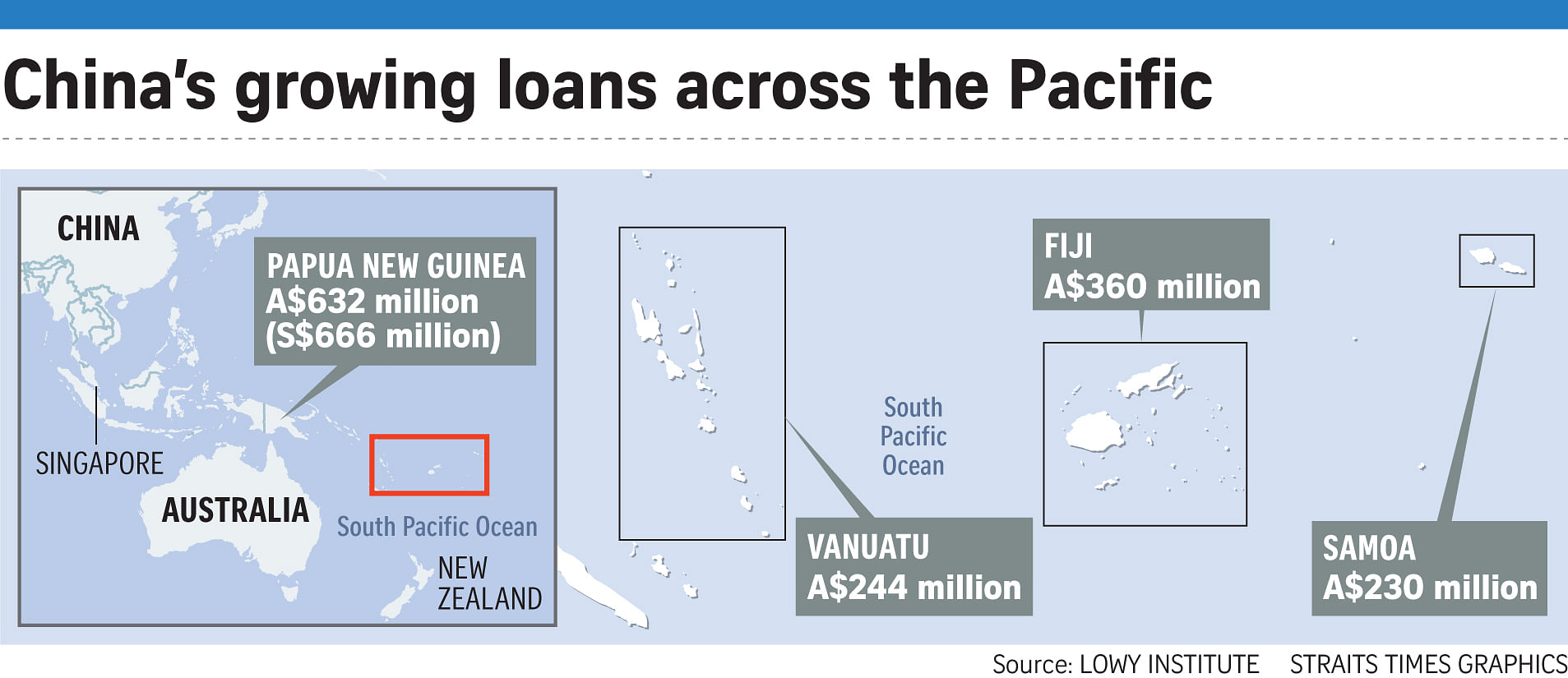Despite being one of Australia's more junior and lesser-known ministers, Ms Concetta Fierravanti-Wells sparked an international diplomatic storm last week with an indelicate tirade against China's "useless" aid in the Pacific.
Earning rebukes from Beijing and small Pacific states, Australia's Minister for International Development and the Pacific accused China of building "roads to nowhere" and "useless buildings" in the Pacific. This irresponsible lending, she suggested, would place a heavy debt burden on small countries that would struggle to make repayments.
The comments added to simmering tensions between Canberra and Beijing. But they also triggered a debate about Beijing's intentions in the Pacific, which was perhaps the original intention of Ms Fierravanti-Wells.
Her comments followed a stormy period in bilateral ties in recent months when Beijing and Canberra have traded barbs over Australia's laws to curb political interference and China's territorial claims in the South China Sea.
According to The Australian newspaper, the junior minister's comments prompted a formal complaint to the Australian embassy in Beijing. The comments also prompted a rebuke from China's foreign ministry spokesman, Mr Lu Kang, who said they were "nothing but irresponsible".
A commentator for Xinhua, Ms Xu Haijing, went further, saying Australia was "behaving like an arrogant overlord".
Australian Foreign Minister Julie Bishop appeared to play down the comments of her junior colleague, issuing a statement saying that Canberra welcomed aid for developing Pacific nations. However, she added that such aid should support growth and avoid imposing "onerous debt burdens".

But the fracas also focused attention on China's growing loans across the Pacific.
According to the Lowy Institute, China provided A$1.8 billion (S$1.9 billion) in aid and loans to South Pacific nations between 2006 and 2016. The main recipients were Papua New Guinea, which received A$632 million, Fiji (A$360 million), Vanuatu (A$244 million) and Samoa (A$230 million).
Most analysts say the aid programme has various purposes, including promoting development and trade, but it is also designed to curry influence.
For years, China has used aid in the Pacific to try to prevent recognition of Taiwan. In turn, Taiwan has used aid to win recognition from some six Pacific nations - roughly a third of all the countries that recognise Taiwan.
An expert on China's investment in the Pacific, Dr Graeme Smith, a research fellow at the Australian National University, said the competition by China and Taiwan to win over financially vulnerable Pacific states had increased following the election victory last year of Taiwan's pro-independence Democratic Progressive Party.
"As long as the Kuomintang was in power (in Taipei), there was an unofficial truce," he told The Straits Times. "The truce is over."
Some analysts have suggested that China's aid was potentially designed to recoup a strategic benefit from the future indebtedness of small Pacific nations. But it can be hard to assess precisely what China seeks to gain from its Pacific aid.
The director of the Lowy Institute's Pacific Islands programme, Mr Jonathan Pryke, said China's aid was "opaque" and often involved loans whose terms were not disclosed.
"In many countries in the Pacific... they are already experiencing significant debt distress as a result of taking out these major loans," he told ABC Radio.
"So it does raise significant questions about China willingness to forgive these loans."
The International Monetary Fund has expressed concerns about the heavy debt pressure facing several Pacific nations, including Tonga, Samoa and Vanuatu.
Perhaps not surprisingly, the governments in these nations were quick to defend their loans from China and attack Ms Fierravanti-Wells.
Samoan Prime Minister Tuilaepa Sailele said the comments were "insulting" to Pacific leaders and could "destroy" ties between Canberra and the region.
"To me, the comments seem to question the integrity, wisdom and intelligence of the leaders of the Pacific Islands," he told ABC News.
Dr Smith said there was merit in concerns about China issuing poorly directed credit to struggling Pacific nations but noted it was the governments of these nations that chose to take these loans.
He said some loans had been misspent but Ms Fierravanti-Wells' condemnation of "roads to nowhere" was unfortunate because paved roads were one piece of infrastructure that was sorely missing in much of the Pacific.
"Whatever is built is a host country request," he said. "The road goes where the Pacific side wants it to go, not where China wants it to go.
"The one thing the Pacific needs is roads. It is good for accessing healthcare, it can mean a kid going to school or it can mean the difference for a farmer getting his goods to market."
